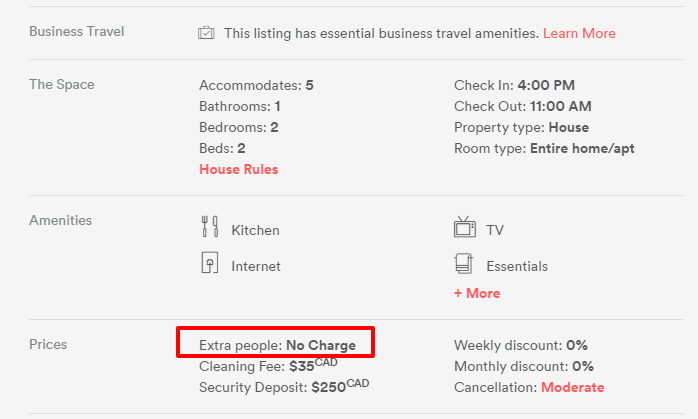Airbnb policies and fees for guests are important to understand before booking a stay. As a guest, you can expect to pay a service fee, cleaning fee, and possibly a security deposit.
Additionally, Airbnb has strict cancellation policies that vary depending on the host’s rules. It is important to familiarize yourself with these policies to avoid any surprises during your stay. We will provide a comprehensive guide to understanding Airbnb policies and fees for guests, including what to expect when booking, how to handle cancellations, and how to ensure a smooth and enjoyable stay.
Whether you are a seasoned Airbnb user or a first-time guest, this guide will help you navigate the ins and outs of Airbnb policies and fees.
Contents
Booking Policies
When booking an accommodation through Airbnb, it is essential for guests to understand the various policies and fees associated with their reservation. One of the key aspects to consider is the booking policies, which encompass the cancellation and refund policies. These policies provide guests with important information about the terms and conditions related to their bookings, ensuring a smooth and transparent experience throughout their stay.
Cancellation Policy
Understanding the cancellation policy is crucial for guests as it outlines the rules and potential fees associated with canceling a reservation. Airbnb offers different cancellation options, each with its own set of rules and refund eligibility. It’s important for guests to familiarize themselves with the specific cancellation policy applicable to their booking to avoid any unexpected charges. The following are the common types of cancellation policies offered by Airbnb:
- Flexible: This policy allows guests to cancel up to 24 hours before check-in and receive a full refund, excluding service fees.
- Moderate: Guests can cancel up to 5 days before check-in and receive a full refund, excluding service fees.
- Strict: With this policy, guests can receive a 50% refund if they cancel at least 1 week before check-in.
- Super Strict: This policy is usually applied to special circumstances and may require documentation for a refund.
Refund Policy
Guests should also familiarize themselves with the refund policy to understand the process of receiving a refund in the event of a cancellation or other qualifying circumstances. The refund policy outlines the conditions under which guests may be eligible for a full or partial refund, including any applicable fees. It’s important for guests to be aware of the following key points related to the refund policy:
- Refund Eligibility: The circumstances under which a guest may be eligible for a refund, such as unforeseen travel issues or property-related concerns.
- Refund Process: The steps involved in requesting and processing a refund, including any documentation or communication required.
- Timeline: The expected timeline for receiving a refund, which may vary depending on the nature of the cancellation or issue.
Accommodation Fees
When booking an Airbnb accommodation, guests should be aware of the various fees associated with their stay. Understanding these fees is crucial for budgeting and ensuring a seamless booking experience. Among the different types of fees, accommodation fees play a significant role in the overall cost of the stay. This section will delve into the specifics of accommodation fees, including cleaning fees and service fees, helping guests gain a comprehensive understanding of what to expect when making an Airbnb reservation.
Cleaning Fee
When booking an Airbnb, guests may encounter a cleaning fee, which is a one-time charge that covers the cost of cleaning the accommodation after their stay. It is important to note that cleaning fees are non-negotiable and are set by the host. These fees vary depending on the size of the property and the host’s cleaning standards. While it may seem like an additional cost, the cleaning fee ensures that guests arrive at a well-maintained and hygienic space. Here are some key points to consider regarding cleaning fees:
- Non-Negotiable: Cleaning fees are predetermined and non-negotiable, meaning guests cannot haggle or negotiate this cost.
- Varied Costs: The cleaning fee varies based on factors such as property size, location, and the host’s cleaning standards.
- Transparency: Hosts are required to disclose the cleaning fee upfront, allowing guests to factor this cost into their overall budget.
Service Fee
Another important aspect of Airbnb accommodation fees is the service fee, which is charged by Airbnb to cover the cost of their services, including customer support, secure bookings, and a range of other benefits. This fee is calculated as a percentage of the total reservation cost and is typically displayed at the time of booking. Here are some essential details about service fees:
- Transparent Pricing: Airbnb provides transparency by clearly displaying the service fee during the booking process, ensuring guests are aware of the additional cost.
- Percentage-Based: The service fee is calculated as a percentage of the total reservation cost, varying based on the duration and overall price of the stay.
- Support and Security: The service fee contributes to Airbnb’s ability to provide 24/7 customer support, secure payment processing, and protection against fraudulent listings.
Additional Charges
Understanding Airbnb Policies And Fees for Guests is essential to ensure a smooth and hassle-free experience. In addition to the base price of a reservation, guests may encounter additional charges depending on the specific policies of the host. These additional charges are designed to protect both the host and the guest, and it is important to be aware of them before making a booking. This section will discuss two common types of additional charges: Security Deposit and Extra Guest Fee.
Security Deposit
A Security Deposit is a refundable amount that hosts may require from guests to cover any potential damages or losses during their stay. It serves as a form of protection for hosts, allowing them to have a financial backup in case of any unforeseen incidents. The Security Deposit is usually collected at the time of booking and is released back to the guest after their stay, provided there are no damages or violations of the host’s rules.
Here are some key points to keep in mind regarding Security Deposits:
- The amount of the Security Deposit is determined by the host and can vary from one listing to another.
- Hosts are required to clearly state the amount of the Security Deposit in their listing description, along with any specific rules or conditions regarding its refund.
- Guests should carefully review the host’s cancellation policy to understand if the Security Deposit is refundable in case of cancellation.
- If a host claims damages or losses, both the guest and the host can submit evidence and Airbnb will mediate to resolve any disputes.
Extra Guest Fee
Some hosts may charge an Extra Guest Fee for each additional guest beyond the specified occupancy limit of their listing. This fee helps cover the additional costs associated with accommodating more guests, such as providing extra bedding, towels, and amenities. It is important for guests to accurately indicate the number of people staying during the booking process to ensure transparency and avoid any unexpected charges.
Here are a few important details about Extra Guest Fees:
- The Extra Guest Fee is determined by the host and is usually mentioned in the listing description.
- Hosts may have different policies regarding the maximum number of guests allowed in their listing.
- Guests should ensure they accurately indicate the number of guests when making a reservation to avoid any issues or additional charges upon arrival.
- Hosts have the right to cancel a reservation or charge additional fees if the number of guests exceeds the agreed-upon limit.

Credit: awning.com
Communication And Feedback
Understanding Airbnb Policies And Fees for Guests is crucial for a smooth and enjoyable experience. One important aspect of this understanding is effective communication and providing feedback. By familiarizing yourself with the host communication expectations and knowing how to provide feedback, you can ensure a positive and satisfactory stay.
Host Communication Expectations
When booking an Airbnb, it’s essential to be aware of the host’s communication expectations. Hosts may have different preferences regarding the frequency and method of communication. By respecting these expectations, you can establish a good rapport with your host and avoid any misunderstandings. Here are some key points to consider:
- Read the host’s profile and listing description thoroughly to understand their preferred mode of communication. Some hosts may prefer messages through the Airbnb platform, while others may provide their contact information for direct communication.
- Be mindful of the host’s response time. While hosts strive to be prompt in their replies, they may have other commitments that affect their availability. Give them a reasonable amount of time to respond before reaching out again.
- If you have any questions or concerns during your stay, communicate them clearly and politely to your host. This open line of communication can help address any issues promptly and ensure a comfortable stay.
Providing Feedback
Feedback is essential for the Airbnb community as it helps hosts improve their listings and provides valuable information for potential guests. When providing feedback, keep the following points in mind:
- Be honest and constructive in your feedback. Highlight both positive aspects and areas for improvement.
- Use the Airbnb review system to share your experience. This allows future guests to make informed decisions based on your feedback.
- If you encounter any issues during your stay, communicate them to your host privately first. Give them an opportunity to address the problem before leaving a negative review.
- Focus on specific details rather than making general statements. This helps hosts understand the specific areas they can improve upon.
Remember, effective communication and providing feedback are crucial for a successful Airbnb experience. By understanding the host’s communication expectations and providing honest feedback, you contribute to a positive and transparent Airbnb community.
Legal And Safety Considerations
As an Airbnb guest, it’s important to understand the policies and fees associated with your stay. Along with this, it’s essential to be aware of the legal and safety considerations that come with using a home-sharing platform like Airbnb. While Airbnb has put in place various safety measures, it’s still important to be aware of potential risks and how to mitigate them.
Liability Issues
One of the most critical legal considerations for Airbnb guests is liability. As a guest, you need to be aware of your responsibility for any damages or injuries that occur during your stay. Airbnb offers Host Protection Insurance, which provides primary liability coverage for hosts in case of third-party claims of property damage or bodily injury. However, this insurance does not cover guests, so it’s important to take steps to protect yourself. Here are some tips:
- Read the listing description and house rules carefully before booking to understand what is and isn’t allowed.
- Report any damages or safety concerns to the host as soon as possible.
- Consider purchasing travel insurance that includes liability coverage.
If you accidentally damage something during your stay, you should report it to the host immediately and offer to pay for the repair or replacement. Most hosts appreciate honesty and are willing to work with guests to resolve any issues.
Safety Regulations
Along with liability, safety is another crucial consideration for Airbnb guests. Airbnb has implemented several safety measures to protect guests, including:
- Hosts must meet certain criteria to list their property on Airbnb, including providing valid ID and undergoing a background check.
- Airbnb verifies the accuracy of listings and provides a secure messaging system for communication between hosts and guests.
- Airbnb has a 24/7 global support team that can assist with emergencies and safety concerns.
Despite these measures, guests should still take steps to ensure their safety during their stay. Here are some tips:
- Research the neighborhood before booking to ensure it’s safe and convenient for your needs.
- Check the property’s safety features, such as smoke detectors and fire extinguishers.
- Communicate with the host before arrival to ensure you have all the information you need, such as check-in procedures and emergency contacts.
- Trust your instincts – if something feels off or unsafe, don’t hesitate to contact Airbnb support or local authorities.
By understanding the legal and safety considerations of using Airbnb, you can have a safe and enjoyable stay while avoiding any potential issues or risks.

Credit: community.withairbnb.com
Tips For Managing Costs
As a guest using Airbnb, it’s essential to understand the policies and fees associated with booking a rental. While there are many benefits to using Airbnb, such as affordable prices and unique accommodations, it’s essential to keep an eye on the costs to avoid overspending. In this post, we’ll explore some tips for managing costs when using Airbnb, focusing on budgeting for fees and maximizing value.
Budgeting For Fees
When booking an Airbnb rental, it’s essential to understand the fees you’ll be charged. The total cost of your stay will include the nightly rate plus any additional fees, such as cleaning fees or service fees. Here are some tips for budgeting for these fees:
- Read the listing carefully: Before booking a rental, make sure to read the listing carefully to understand what fees you’ll be charged.
- Factor in cleaning fees: Many Airbnb rentals charge a cleaning fee, which can vary depending on the size of the rental and the location. Make sure to factor this fee into your budget when booking.
- Consider the service fee: Airbnb charges a service fee for each booking, which can range from 0-20% of the total cost. Keep this fee in mind when budgeting for your stay.
- Use the price range filter: When searching for rentals, use the price range filter to find options that fit your budget.
Maximizing Value
While it’s essential to keep an eye on costs when using Airbnb, you can also maximize value by following these tips:
- Look for deals: Airbnb often offers deals and discounts, such as last-minute bookings or longer stays. Keep an eye out for these promotions to save money on your rental.
- Book in advance: Booking in advance can often result in lower prices, especially during peak travel seasons.
- Consider location: While it may be tempting to book a rental in a popular tourist area, you may be able to find better value by staying in a less crowded neighborhood.
- Check for amenities: Make sure to read the listing carefully to understand what amenities are included. Choosing a rental with a kitchen, for example, can save money on dining out.

Credit: vacationhomehelp.com
Frequently Asked Questions
What Fees Does Airbnb Charge Guests?
Airbnb charges guests a service fee that covers the cost of using their platform. The fee is typically a percentage of the total reservation amount, and it helps support the services and features provided by Airbnb.
How Does Airbnb Payment Work For Guests?
Airbnb payment for guests is simple. Guests provide payment details when booking, and Airbnb charges them once the host confirms. The payment includes the cost of the reservation and any additional fees. Guests can pay using various methods, such as credit cards or PayPal.
How Do I Decide What To Charge For Airbnb?
To decide what to charge for Airbnb, research similar listings in your area. Consider factors like location, amenities, and demand. Set a competitive price to attract guests and maximize earnings. Regularly review and adjust your rates based on market trends and feedback.
What Is The 15% Host Fee On Airbnb?
The 15% host fee on Airbnb is a commission charged to hosts for each booking. It covers the cost of using the platform, including customer support and other services.
Conclusion
Understanding Airbnb policies and fees is essential for a smooth guest experience. By familiarizing yourself with the rules and charges, you can avoid surprises and make informed decisions. Remember to review the cancellation policy and additional charges to ensure a stress-free stay.
Being well-informed will help you enjoy your Airbnb experience to the fullest.


